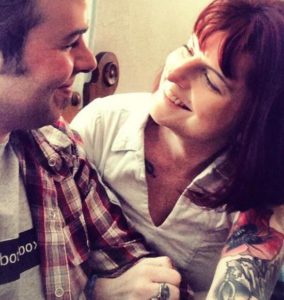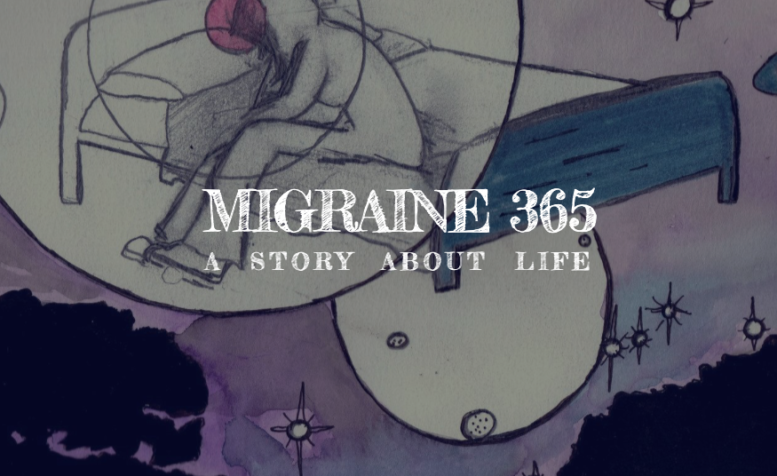By DAVID DUPONT
BG Independent News
Elizabeth Roberts-Zibbel doesn’t take her migraines lying down.
Migraine disease may immobilize her at times, but she’s resolved to be a voice for others who suffer.
It means being active on social media as Lady Migraine at ladymigraine.com. It means writing for migraine.com, and appearing in videos being the face for the many tormented by the silent demon.
It means teaming with her husband John Roberts-Zibbel to write a graphic journal, “Migraine 365,” that looks at daily life for someone with migraine disease and their loved ones. In their case that includes two daughters Isobel, 8, and Alexandra 12.
The book was self-published and can be purchased at blurb.com.

John and Elizabeth Roberts-Zibbel
“I don’t remember a time when I didn’t have them,” she said of the severe headaches and array of symptoms that accompany them.
She was diagnosed when she was a child and remembers always having at least one per week, but the headaches didn’t become chronic, fifteen or more per month, until she was 30. “It was always a big problem,” Roberts-Zibbel said. “It took me a lot longer to get through college.”
She persisted, but so did the migraine disease. Her first pregnancy was debilitating, and her second even worse.
“Sometimes the pain gets so bad you want to shoot yourself in the head.”
The disease forced her out of jobs. Now as a partner in Zibbel Media, she is a key player on the BG Independent News team, handling advertising, posting obituaries, and occasionally contributing articles.
John Roberts-Zibbel got the idea for “Migraine 365” in 2014 while the family was on vacation in Cape May, New Jersey. Everything was going wrong, including no air conditioning in the middle of summer. And weather, Elizabeth said, “is one of my worst triggers.”
John has been involved in the world of fantasy and comics for years, both as an illustrator and with his live rapping character The Mechanical Cat, who makes regular appearances at local clubs.
Drawing during that hellish vacation, he got the idea of chronicling the daily life of the family, and how migraine disease weaves through it, and how the various members, including the children, maneuver through it.
Elizabeth provided the narrative and poems.
“The idea is to show what it is to live with migraine disease,” John said.
He also launched a website for the project, which he said has reached 3,000 families touched by migraine disease. “And people are still visiting it.”
“Migraine 365” isn’t just about the headaches. The book starts on the first day of the Ferguson riots.
The year was an eventful one. Elizabeth Roberts-Zibbel started participating in drug trials to find better medications to treat the pain and symptoms of migraine disease.
On the family front Alexandra started participating in Horizon Youth Theatre with her mother becoming involved in helping manage the troupe. Now both girls participate. They both had parts in the recent production of “Cinderella.”
John and Elizabeth tried to represent days when not much happened as well, though there were times when a hectic life kept John away from his drawing tools.
He had a little help. “Each girl has a page they drew themselves,” Elizabeth said. “It makes them feel proud.”

A collection of “Migraine365” pages
“Migraine 365” is a vivid representation of “an invisible disease.”
“You don’t look sick,” Elizabeth said. “You have to prove you are sick.” Even in sixth grade, her teacher told her she would “never get away with” her absences in later life.
There is a kind of pain Elizabeth willingly endures. She has a well-tattooed body, several of them representing her battles with migraine disease.
“I’m asking for it and paying for it and it leaves something beautiful on my body,” she said, “as opposed to the pain that comes from nature that you didn’t ask for, migraine that leaves nothing behind.”
Tattoos are a pain she can control, unlike migraine which comes unbidden, triggered by smells, foods and, the weather.
She relies on medication to help her control it. She cannot surrender; she has a life to live, children to care for.
Elizabeth said she’s wary of efforts made to restrict access to painkillers prompted by a legitimate concern for those hooked on opioids.
Many people, like her, rely on them for their quality of life.
“Pain patients are being punished for people buying opioids on the street,” she said. While she personally has “nothing to complain about,” at this point, new rules and laws “make docs gun shy” about prescribing pain medications.
June is Migraine Awareness Month but for Elizabeth and millions of others, the pain is part of the web of life. She confronts and documents it 365 days a year.

